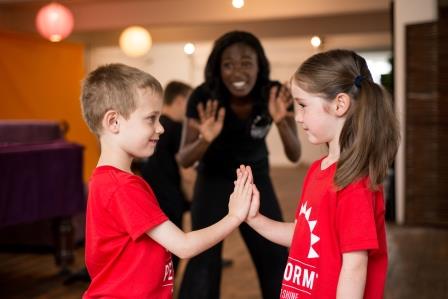Confidence: the best present you can give your child

Linda Blair, Clinical Psychologist and author, looks at how the pandemic has affected our children and the role which drama classes can play in helping them return to being themselves.

Can drama classes help your child recover from the social isolation, fear and anxiety we’ve all experienced during the past 21 months? The answer is a resounding ‘yes’ – and the benefits they’ll enjoy will extend far beyond their recovery. Participating in drama wil enrich your child's life - and our own - in countless ways.
But lets start with the past 21 months. We began this period in fear and confusion. A massive change that none of us had experience before was imposed and almost without warning. Most of us were confined to our homes for 23 hours every day and this period was followed by months of continuing uncertainty. Now, even though restrictions have eased, many remain anxious, afraid to socialise or participate in any new activities.
Yet socialinteraction is what children need most (alongside unconditional love) if they are to develop normally and thrive as adults. No doubt you realised this during lockdowns and you tried your best to help your children maintain a connection with others throughout. But as you also know, screens and phones, although wonderful ways to keep in touch, are limited in what they can teach us about other people's true thoughts, feelings and intentions. Drama classes re-introduce socialising in ways that allow children to regain confidence and rebuild their self-esteem.
But as you also know, screens and phones, although wonderful ways to keep in touch, are limited in what they can teach us about other people's true thoughts, feelings and intentions.

In order to understand why drama classes are so effective, let’s start by considering what children need to develop strong interpersonal skills. Contrary to what you might think, IQ is not the key. According to psychologist Daniel Goleman, author of the 1995 best seller Emotional Intelligence, the ability to recognise, understand and manage our own emotions and those of others – just what is taught in drama classes – is central to well being. In fact, Goleman cites a study from the Harvard Business School that shows that emotional intelligence (EQ) counts for twice as much as both IQ and technical skills when it comes to determining an individual's success. Other studies have shown EQ to be closeley related to better physical health and greater emotional wellbeing.
To develop this valuable quality, children must first learn how to understand their own thoughts and feelings and learn how to regulate them. Only then can they understand the thoughts feelings and behaviours of others. Drama classes increase personal and social awareness skills they had less chance to develop during the lockdowns.
To develop this valuable quality, children must first learn how to understand their own thoughts and feelings and learn how to regulate them.
There are other ways, too, that participating in drama classes will help your child. Here are some of them:
Drama can help reduce anxiety
Every activity that’s practiced – speaking, singing, moving in harmony with others – demands controlled breathing, which is the basis of anxiety management. When children learn to control and manage the way they breathe, they will be able to control any symptoms of anxiety.
It helps communication and effective social interactions
When we think of communicating well, we think of speaking clearly. But there are so many more ways to indicate our desires and feelings, for example by the way we move our bodies, when and how we make eye contact, when we insert pauses in speech and what we don't say. Drama classes widen children's ability to communicate and to understand the intentions of others.
It can improve your child's success at school
Drama classes will boost school success by challenging children’s memory and increasing their vocabulary. Learning how to fine-tune their movements in relation to others means they’ll also feel more confident when they participate in school sports, particularly team sports – and this they’ve sorely missed during the restrictions.
Your child will feel proud!
The challenges in drama classes are offered in small achievable steps, so children will enjoy success over and over again.
Drama helps foster inclusivity
Finally, and perhaps most important, drama classes encourage cooperation and will provide a place where your child feels welcomed and where they can enjoy a sense of belonging – and this is true for children of all ages and with all levels of ability. In particular, children with special needs reap huge benefits when they’re encouraged to participate in drama. This was discovered by Rinat Feniger-Schaal and Hod Orkibi, at the University of Haifa, when they reviewed 24 studies that offered drama therapy to people of all ages and with a wide range of special needs.
The benefits of drama truly are a gift that keeps on giving. Drama classes can help your child in countless ways both socially and cognitively, as well as by fine-tuning their physical abilities. There’s no better present we can give our children than the gift of confidence.












Leave a comment